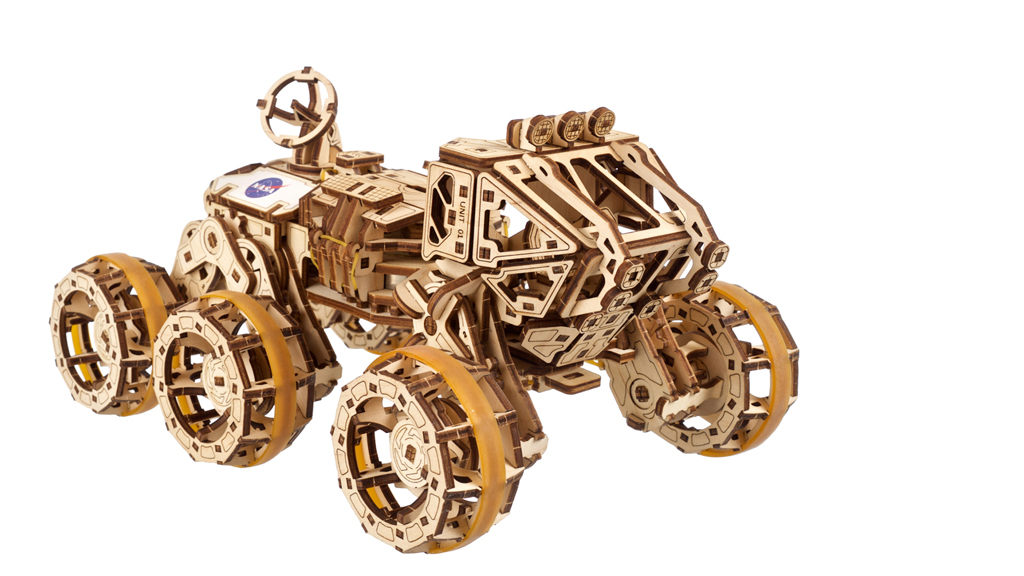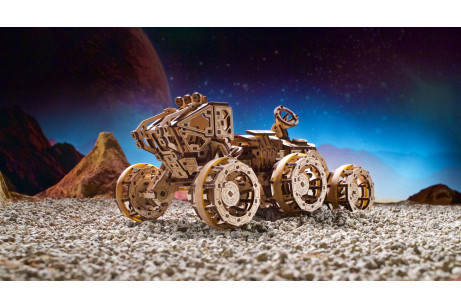
item: 4820184121782
Number of components: 562
Level: Advanced
Manned Mars Rover | Assemble me. Explore the Red Planet with Me!
Imagine the future of space exploration with Ugears' Manned Mars Rover, an all-terrain planetary explorer with 6x6 all-wheel drive, a cab for two astronauts, spring-driven motor, a swivel between cab and body, and fully-sprung independent suspension. This DIY model space rover has its front centerline pushed forward for better climbing and stability, front wheels that turn for maneuverability, and large diameter wheels to overcome obstacles while navigating the Martian landscape. A ramp folds down in the back, while a top-mounted dish antenna rotates 360° and can swivel up and down to transmit or receive signals to and from the base.
The Manned Mars Rover has a storage bay for tools and equipment or rock samples. Open it up to reveal the ratchet key that winds the spring motor. On the back left panel is a Start/Stop slide switch. Set the switch to "Stop" before giving the ratchet key several twists, then close the bay, flip the switch to "Start" and watch as your rover sets off to explore the red planet. Set up your own Martian obstacle course and be amazed at how the rover's six wheels cushion the bumps thanks to independent suspension, while rubberized wheels provide grip on smooth surfaces.
Laser engraving provides a level of detail and realism—just look at the cab's dashboard and the solar panels on top of the hatch. You can place a sticker with the official NASA insignia on your Rover's right side panel! The insignia, in use since 1959, features a blue sphere representing a planet, a v-shaped red wing representing aeronautics, stars that represent space, and a white circular orbit around the space agency's name. NASA Insignia and identifiers provided and used with permission of NASA.
NASA's Artemis II mission, scheduled for November 2024 launch, will pave the way for a permanent lunar outpost and eventually a crewed mission to Mars. If humanity makes it all the way to Mars we're going to need a way to get around. People have a love affair with cars, and it's no surprise that not long after Neil Armstrong's first steps on the moon (Apollo 11, July 21, 1969) astronauts David Scott and James Irwin were driving around the lunar surface in a "moon buggy" (Apollo 15, July 31, 1971). The most scientifically interesting moon rocks never would have been collected if we hadn't taken a car to space, for greater range of exploration. The LRV ("Lunar Roving Vehicle") was an impressive piece of engineering, having to bear twice its 209 kg weight, withstand micrometeoroids traveling faster than bullets, and reliably operate in 500° F temperature swings. Two engineers at General Motors saw the project through: Polish-born Mieczyslaw Gregory Bekker and Hungarian-born Ferenc Pavlics. Gentlemen, we salute you! Three LRVs remain in long-term parking on the lunar surface.
This imaginative, next-generation DIY wooden model planetary rover is made of art-quality composite wood. One of the great features of Ugears is that you don't need glue or special tools to build our models: everything you need for assembly comes in the box. Just push the pieces out of their precision laser-cut boards and snap them together following the step-by-step, full-color illustrated instructions in 11 languages (Ukrainian, English, German, French, Polish, Spanish, Portuguese, Italian, Chinese, Japanese and Korean). Be sure to "develop" the gearing by lubricating and operating all moving elements during construction, for optimal function of your Manned Mars Rover. If you break a part during assembly, just let our customer service team know. Replacement parts are free, as part of our overall commitment to customer service.
The Ugears Manned Mars Rover is "big brother" to our Mars Rover mini model, and a far-out addition to our already impressive collection of all-terrain vehicles, including the Tracked Off-Road Vehicle, Desert Buggy, Military Truck, Dozor-B Combat Vehicle, and Scrambler UGR-10 Motorbike. Collect them all, compare their performance, and think about how engineers tailor design to meet the needs of the mission!

Model size: 11.8*5.7*7.3 in (30*14.5*18.5 cm)
Package size: 14.7*6.7*2 in (37.3*17*5 cm)

Assembling without glue and chemicals

Details are already cut and ready to assemble

The models produce motion

Perfect for family projects through hands-on STEM learning